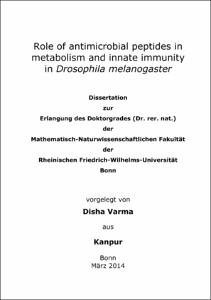Varma, Disha: Role of antimicrobial peptides in metabolism and innate immunity in Drosophila melanogaster. - Bonn, 2014. - Dissertation, Rheinische Friedrich-Wilhelms-Universität Bonn.
Online-Ausgabe in bonndoc: https://nbn-resolving.org/urn:nbn:de:hbz:5n-37003
Online-Ausgabe in bonndoc: https://nbn-resolving.org/urn:nbn:de:hbz:5n-37003
@phdthesis{handle:20.500.11811/6142,
urn: https://nbn-resolving.org/urn:nbn:de:hbz:5n-37003,
author = {{Disha Varma}},
title = {Role of antimicrobial peptides in metabolism and innate immunity in Drosophila melanogaster},
school = {Rheinische Friedrich-Wilhelms-Universität Bonn},
year = 2014,
month = aug,
note = {“Metabolism” and “Immunity” are two essential, recognized and independent functions of animal kingdom. They have their own biological cycle independent of each other. While metabolism contributes, amongst other things, to the growth and size of the organism; immunity on the other hand defends and is responsible for the health and longevity of the organism. If immunity is enhanced then an organism becomes stronger and may live longer.
The role of antimicrobial peptides (AMPs) was analyzed in metabolism and innate immunity in D. melanogaster. The cross regulation mechanism was shown in larvae, wherein, dFOXO regulates AMPs, namely Drs independent of the Toll and IMD pathways. It unveiled a new mechanism for the regulation of AMPs by Insulin-like signaling pathway (IlS), known to regulate growth, energy homeostasis and life-span.
For the first time it was examined whether such a cross regulation also occurs in the D. melanogaster adult flies. The adult flies, unlike the larvae that feed continuously, come in contact with various pathogens and have a complex metabolism. Thereby, it was interesting to study the regulation of AMPs in this stage where the fluctuation in expression levels based on development was absent. With an amalgamation of genetic and biochemical experiments a similar mechanism was observed in the adult flies, highlighting the existence of the fact that metabolism can regulate immunity through the dFOXO - AMP relationship via the key transcriptional factor dFOXO. Thereby, a dFOXO dependent mode of AMP expression probably aids the organism to defend against microbial invasion and oscillatory energy status without the severe side effects induced by activation of NF-κB-like signaling pathways.
Furthermore, it was analyzed whether target of rapamycin (TOR), another major regulator of growth and metabolism, also modulates AMP responses in the fly. The manipulation of TOR resulted in a specific induction of the AMPs Dpt and Mtk. The FKH-dependent induction of Dpt and Mtk can be triggered in dFOXO null mutants and in immune-compromised Toll and IMD pathway mutants indicating that FKH acts in parallel to these regulators.
Together, it was discovered that FKH is the second conserved member of the Forkhead family cross-regulating metabolism and innate immunity. dFOXO and FKH, which are activated upon downregulation of insulin or TOR activities, respectively, act in parallel to induce different sets of AMPs, thereby modulating the immune status of metabolic tissues such as the fatbody or the gut in response to the oscillating energy status of the organism.},
url = {https://hdl.handle.net/20.500.11811/6142}
}
urn: https://nbn-resolving.org/urn:nbn:de:hbz:5n-37003,
author = {{Disha Varma}},
title = {Role of antimicrobial peptides in metabolism and innate immunity in Drosophila melanogaster},
school = {Rheinische Friedrich-Wilhelms-Universität Bonn},
year = 2014,
month = aug,
note = {“Metabolism” and “Immunity” are two essential, recognized and independent functions of animal kingdom. They have their own biological cycle independent of each other. While metabolism contributes, amongst other things, to the growth and size of the organism; immunity on the other hand defends and is responsible for the health and longevity of the organism. If immunity is enhanced then an organism becomes stronger and may live longer.
The role of antimicrobial peptides (AMPs) was analyzed in metabolism and innate immunity in D. melanogaster. The cross regulation mechanism was shown in larvae, wherein, dFOXO regulates AMPs, namely Drs independent of the Toll and IMD pathways. It unveiled a new mechanism for the regulation of AMPs by Insulin-like signaling pathway (IlS), known to regulate growth, energy homeostasis and life-span.
For the first time it was examined whether such a cross regulation also occurs in the D. melanogaster adult flies. The adult flies, unlike the larvae that feed continuously, come in contact with various pathogens and have a complex metabolism. Thereby, it was interesting to study the regulation of AMPs in this stage where the fluctuation in expression levels based on development was absent. With an amalgamation of genetic and biochemical experiments a similar mechanism was observed in the adult flies, highlighting the existence of the fact that metabolism can regulate immunity through the dFOXO - AMP relationship via the key transcriptional factor dFOXO. Thereby, a dFOXO dependent mode of AMP expression probably aids the organism to defend against microbial invasion and oscillatory energy status without the severe side effects induced by activation of NF-κB-like signaling pathways.
Furthermore, it was analyzed whether target of rapamycin (TOR), another major regulator of growth and metabolism, also modulates AMP responses in the fly. The manipulation of TOR resulted in a specific induction of the AMPs Dpt and Mtk. The FKH-dependent induction of Dpt and Mtk can be triggered in dFOXO null mutants and in immune-compromised Toll and IMD pathway mutants indicating that FKH acts in parallel to these regulators.
Together, it was discovered that FKH is the second conserved member of the Forkhead family cross-regulating metabolism and innate immunity. dFOXO and FKH, which are activated upon downregulation of insulin or TOR activities, respectively, act in parallel to induce different sets of AMPs, thereby modulating the immune status of metabolic tissues such as the fatbody or the gut in response to the oscillating energy status of the organism.},
url = {https://hdl.handle.net/20.500.11811/6142}
}






